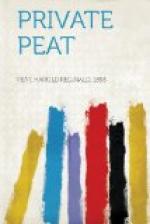WHO STARTED THE WAR?
The wisest thing that our commanders did was to sandwich the Canadian boys in with the British regulars. Without a doubt we of the First Division were the greenest troops that ever landed in France.
In two short turns that we spent with the British, we learned more than we could have otherwise in a month’s training. We also became inspired with that “Keep cool and crack a joke” spirit that is so splendidly Anglo-Saxon.
I am not an Englishman, and I did not think very much of an Englishman before going overseas. I regarded him more or less as not “worth while.” It did not take a year to convince me that the Englishman is very much “worth while.”
The English soldier chums up quickly. The traditional formality and conventionality of the English are traditions only. There is none of it in the trenches.
Discipline there is, strict discipline, among men and officers. Between officer and man there is a marked respect, and a marked good fellowship which never degenerates into familiarity.
There is love between the English officer and the English soldier. A love that has been proved many times, when the commissioned man has sacrificed his life to save the man of lower rank; when the private has crossed the pathway of hell itself to save a fallen leader.
The English soldier, and when I say English I mean to include Welsh, Scotch and Irish, reserves to himself the right to “grouse.” He grouses at everything great or small which has no immediate or vital bearing on the situation. As soon as anything arises that would really warrant a grouse—napoo! Tommy Atkins then begins to smile. He grouses when he has to clean his buttons; he grouses loudly and fiercely when a puttee frays to rags, and he grouses when his tea is too hot.
But when Tommy runs out of ammunition, is partly surrounded by the enemy, is almost paralyzed by bombardment; when he is literally in the last ditch, with a strip of cold steel the only thing between him and death—then Tommy smiles, then he cracks a joke. Without a thought of himself, without a murmur, he faces any desperate plight.
He smiles as he rattles his last bullet into place; he grins as his bayonet snaps from the hilt, and he goes to it hand-to-hand with doubled fists, a tag of a song on his lips, for “Death or Glory.”
That is Tommy Atkins as I saw him. That is the real Britisher of the Old Country. We shall know him from now on in his true light, and the knowledge will make for a better understanding among the peoples of the English-speaking world.
It was Sandy Clark who, eating a hunch of bread and bully beef in a dugout, got partly buried when an H.E. (high explosive) came over. Sandy crawled out unhurt, his sandwich somewhat muddy but intact, and made his way down the trench to a clear space. Here he sat down beside a sentry, finished his bully beef and muddy bread, wiped his mouth, and remarked some ten minutes after the explosion: “That was a close one.”




